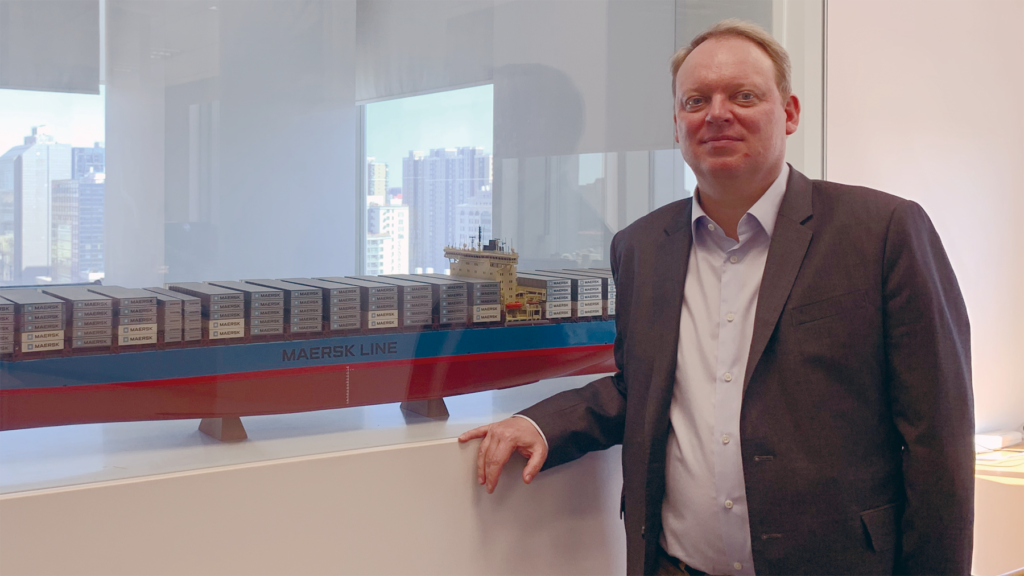
Talking logistics along the Belt and Road with Maersk China Ltd
Most of the projects associated with the Belt and Road Initiative (BRI) centre around infrastructures like bridges, ports and railways, but the over-arching theme is connections – linking up supply chains from landlocked or far-flung regions with markets and consumers. When it comes to supply chains, one of the most informed players in the industry is the shipping giant Maersk. That is why EURObiz grabbed the opportunity to interview Jens Eskelund, managing director of Maersk China Ltd—who also serves as vice chair on the European Chamber’s executive committee—and gain some insights on the impact the BRI is having on the logistics industry.
You played a major part in helping the European Chamber research and promote its report on the Belt and Road Initiative. Could you give a synopsis of the challenges and opportunities this initiative brings for European shipping and logistics companies?
Other things being equal, we think all players in transportation should welcome the BRI. With a faltering global economy, slowing trade, deflation and over-capacity, a systematic effort such as the BRI to drive growth and expansion of trade is to be welcomed. Whether you are a shipping company, terminal operator, or logistics service provider, there are opportunities to benefit from the new growth potentially unleashed from these initiatives. This is so because the investment in infrastructure will facilitate increased trade, providing more demand for our ships, terminals, trains and supply chain management systems. Specifically, in shipping, the BRI could enable us to open up new routes and services and deploy our excess tonnage. Logistics companies can develop new inland and multi-modal services, e.g. block train services on the overland routes to Europe and so on.
But reality is complex, and there are a number of questions which will need to be resolved before the BRI can live up to its potential. For example, how do we balance the need for planning with allowing the market to play its role as the most efficient means of allocating resources? How do we balance the needs and wishes of the many participating nations when we must accept the fact that not every country can become the home of an international hub port and shipping centre? How do we address concerns about China’s strategic intentions behind the initiative?
Many countries and regions have already signed up to the BRI, but are there ways more participation in the initiative could be encouraged?
The private sector must be allowed to participate to a higher degree than we see today. Private companies can contribute not only with investments, but also with expertise. And all historical evidence points to the private sector being more efficient than government entities at allocating capital, ensuring adequate returns and, not least, in understanding the needs of customers. Also, we must ensure that the BRI is open and inclusive to everyone who wants to play a positive role. Bilateral agreements excluding other parties, or reserving business for some companies of a certain nationality, must be avoided at all costs. Protectionism and trade barriers are poison for connectivity and poison for the BRI. I think this is a point with which most Chinese companies would also agree.
But in regard to these matters, there seems to be some work to do still. According to the recent European Chamber study, most BRI-related projects are not open to third party participation. Only a few companies indicated that they played a role in the BRI, and when participating nearly all indicated that they were playing niche roles by providing specific technologies or facilitating projects because of their extensive experience in third markets. According to the study, foreign companies are chiefly brought in to fill in the gaps that Chinese providers cannot. Also, most respondents indicated that they had not learned about opportunities through publicly available procurement information. Nearly all said that they were pulled in by either Chinese business partners or the government with little or no prior knowledge that a project was even underway. The lack of publicly available information and engagement of the business community remains an issue, which is not only a lost opportunity for private businesses but may also lead to costlier and less optimal project solutions.
Chinese state-run logistics companies benefit from subsidies the Chinese Government gives them as incentives to take part in the BRI. In your opinion, does this affect the SOEs’ motivation to ensure they deliver the best services? How can European companies compete with subsidy-backed SOEs?
Chinese state-run companies are not alone in benefitting from subsidies. Many foreign companies are receiving subsidies as well to ensure the success of some initiatives which may not otherwise be economically viable for businesses. But as the European Chamber’s report states, the experience of members is that these are not provided in equal measure to foreign and domestic Chinese companies. Moreover, as a matter of principle, we are not fans of subsidies as they distort the mechanisms of the market, create an uneven playing field, increase opacity and impact fair and free competition.

Photo: Yichi Zhang
The European Chamber has addressed the cabotage problems for foreign-flagged vessels in Chinese ports, while similar restrictions do not affect Chinese-flagged vessels in Europe. What steps do you think European shipping firms or the European Union itself should take to push back against the current Chinese policy?
I am not sure ‘push back’ is the preferred term here. European companies are avid supporters of free trade and, instead of pushing back, we would rather hope that China, in line with statements made at the highest level of government, will continue to further open markets and accordingly offer market access on reciprocal terms to European shipping companies. Chinese shipping companies are not only benefitting from having protected access to the world’s largest domestic market—the Chinese market—they are also benefitting from unhindered access to ship between EU countries. The levels of access are clearly asymmetrical, so we do hope that China will walk the talk on free and reciprocal trade terms. If no change happens, then of course EU regulators should ask themselves if such a discrepancy in terms of market access is sustainable in the long term.
Some Chinese-funded projects along the BRI have been accused of being insensitive or inflexible when it comes to adapting to local conditions and cultures. What advice do you have on adjusting the personnel and culture of a corporation to the needs of a local community?
I think one should be careful about generalising on this point. But I also think the experience of European companies in China could be useful. Just 30 years ago, there were only a few European companies in China, many of which were struggling to find their place and succeed in a business environment so different from what they knew at home. First and foremost, I think European companies have succeeded by hiring and training local talent and placing them in managerial positions in all functions. It takes time to train an executive, in China as elsewhere, but many companies are now beginning to reap the benefits of having invested so heavily in local talent. This has also made it easier for companies to integrate themselves into local communities and to understand and contribute to the realisation of Chinese development goals. It takes trust, courage and an open mind to succeed. I think many Chinese companies are already aware of this and are succeeding abroad. So maybe the solution is to look at these Chinese and foreign successes for inspiration.
Jens Eskelund is the managing director of Maersk China Ltd, an investment company of the Maersk Group in China. The main focus of Maersk China Ltd is to engage with Chinese Government entities, institutions and trade associations on matters of policy, regulatory environment and business development on behalf of the companies within the Maersk Group. Maersk is the world’s biggest container shipping company by capacity and goods volume for the past two decades.


Recent Comments